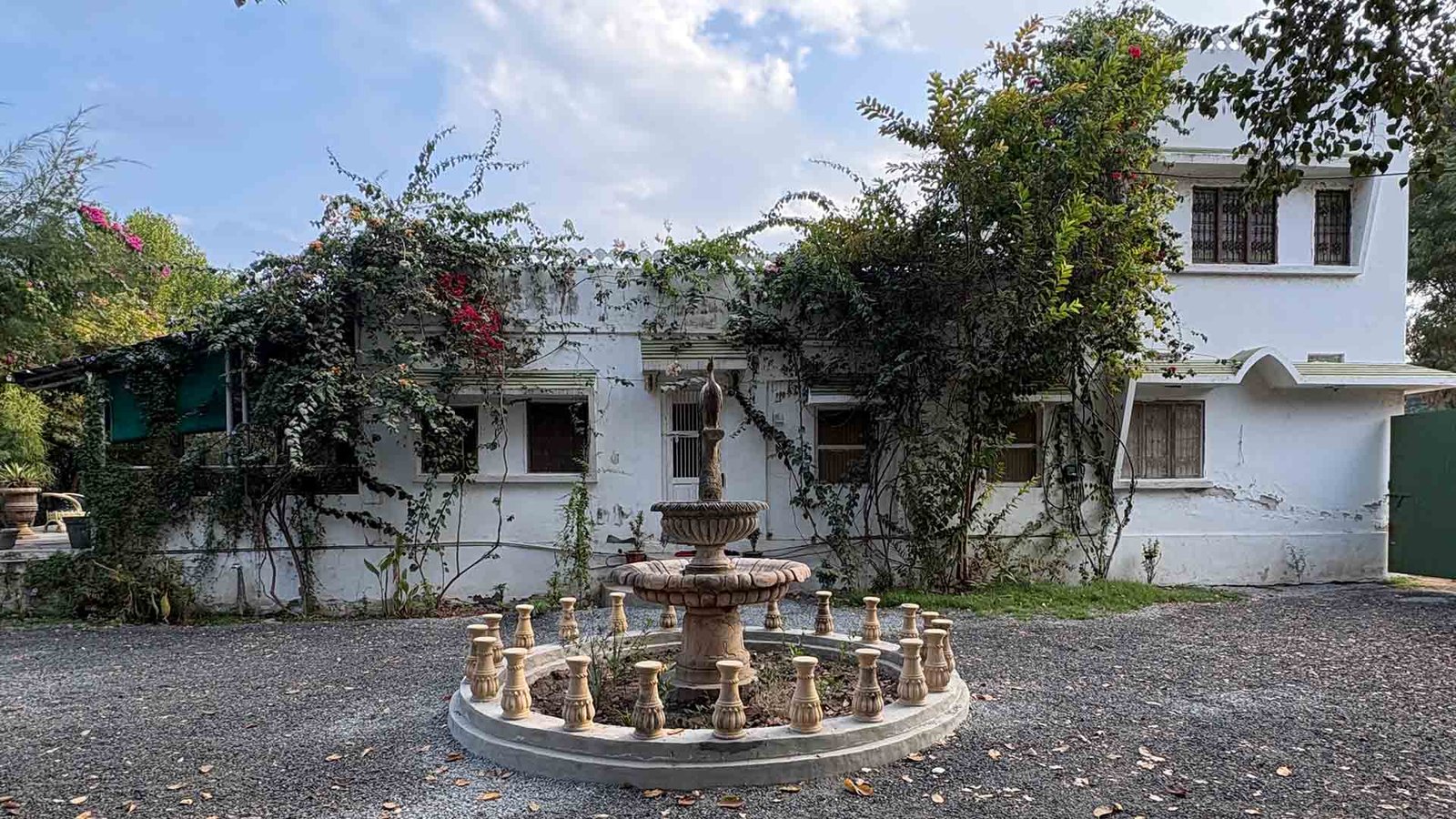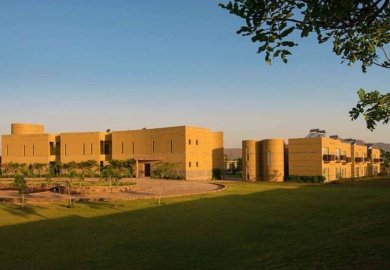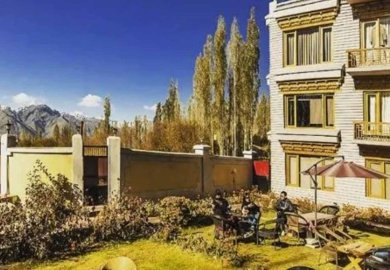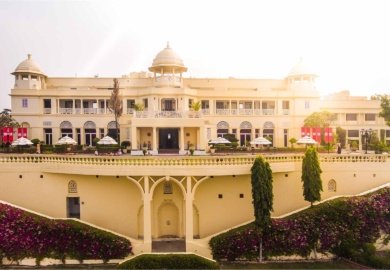The road from the Rann of Kutch felt endless, the kind of stretch that erodes ambition and measures you in kilometers rather than thoughts. We had set out that morning with Beawar as our destination a plan scribbled on a map, bold in daylight but fragile under the weight of the miles. Rajasthan’s distances are deceptive. On paper, a few hundred kilometers, In reality, a landscape that swallows time whole.
By the time the sun dropped behind the horizon, we were still on the road, engines drumming against fatigue. Sheoganj appeared as a cluster of lights along the highway, unremarkable at first glance but heavy with the promise of pause. It was already 8 PM.
Two hundred kilometers still separated us from Beawar. The idea of pushing ahead battled with the weight in our bones. We pulled over on the shoulder, engines clicking as they cooled, the desert night pressing close. Headlights of passing trucks carved brief tunnels of brightness, then vanished into darkness.
We debated, half aloud, half in silence. Push on? Risk fatigue, potholes, the sharp turns that hid in shadows? Or surrender to the night, let the road win for once, and find somewhere, anywhere to rest?
Phones lit up maps. A scatter of hotels appeared on the screen, most uninspiring square buildings, anonymous names, promises of nothing but a mattress. And then one name blinked, quiet and unassuming: Vriksh Jawai The Farm Stay.
A farm. Just three rooms. Run by a scion of a rawla. Hidden. It tugged at something inside me, that word Vriksh tree, shade, patience. And so, we turned off the highway, engines growling softer as we rolled into the dark. We didn’t know it then, but this decision this pause, this surrender would become one of the trip’s most unexpected gifts.
The Farm Reveals Itself
Farm stays don’t shout. They whisper. And Vriksh Jawai whispered in moonlight.
The road narrowed into a lane lined with trees, fields stretched wide on either side, their outlines ghosted in silver. The hum of the highway faded. In its place came the chorus of crickets, the occasional bark of a dog in the distance, and the sound of our own tires crunching gravel.
Then it appeared. A rustic haveli, rising gently from the farm like it had grown there rather than been built. Its stone walls glowed pale under the lanterns hung at its entrance. No neon, no false grandeur. Just a presence. Old bones carrying a new story.
The host greeted us at the gate, not like a manager but like someone welcoming travelers into his orbit. He was the scion of a local rawla ,family a lineage tied to Sheoganj’s history, yet here he was, running a three-room farm stay with the ease of someone who had chosen simplicity without losing pride. His handshake was firm, his smile weary but kind, and in his eyes, there was a spark that made you feel this wasn’t just business. This was continuity.
Inside, the property unfolded like a secret. Only three rooms, each designed with roots and branches both. Thick stone walls kept the heat out, arches framed shadows like art, furniture carried rustic strength rather than polish. Yet there were comforts clean bedding, thoughtful lighting, modern bathrooms tucked discreetly into the old structure.
And then there was the farm itself. Vast, open, breathing. Sit-outs scattered across fields under neem trees, beside flowering patches, along low walls where one could lean back and listen to silence. It wasn’t curated beauty. It was lived beauty.
Peacocks announced themselves almost immediately, strutting across courtyards with the audacity of royalty. Their calls split the night, proud and ancient. And somewhere beyond the fields, the host mentioned with a half-smile, leopards still roamed.
“If you’re lucky,” he said, “you may hear them.”
The thought settled on us like dew. This wasn’t just a stay. This was an invitation into the farm’s wild pulse.
The Night of Food, Rain, and Stories
Dinner was served without pretense. A table laid in the courtyard, a faint bulb overhead, the smell of woodsmoke curling from the kitchen. Plates filled with dal, rotis hot off the tava, sabzi made from vegetables grown in the farm’s soil. Rice that carried the earth’s patience. A pickle that startled and soothed. And ghee so rich you could taste the cow’s shadow in it.
It was food without decoration. Honest food. Food that nourished not only the road’s hunger but also the soul’s fatigue.
And then the sky shifted. A soft rumble rolled across the farm, low at first, then louder, until the night cracked open and rain began to fall. Not desert drizzle, but a steady downpour, fat drops hitting the earth with the sound of applause.
We pulled our chairs closer under a veranda, plates still warm, glasses refilled and the night began to stretch.
The host joined us. Stories spilled as easily as the rain. Stories of Sheoganj’s quiet defiance against modern sprawl. Stories of Jawai, where leopards roam freely and shepherds walk with them as neighbors, not enemies. Stories of his own family of growing up in a haveli where history wasn’t a subject, but the very walls around you.
We spoke of cities too, of Delhi’s restlessness, Bombay’s fatigue, and the strange hunger that drives people away from silence. Laughter punctuated the rain. Glasses clinked, refilled, emptied, refilled again. The rain drummed on the fields, the peacocks cried into the storm, and we sat there travelers, host, farm, night bound together by the kind of intimacy only rain can gift.
When finally, the rain softened and the conversation quieted, we walked back to our rooms, shoes splashing in puddles, shirts damp, hearts oddly light. That night, sleep came not as surrender but as grace.
Morning on the Farm
Light came not through curtains but through birdsong. Peacocks strutted across the courtyard, tails dragging like banners. Their calls stitched the morning into life.
I stepped outside barefoot. The ground was cool from the rain, the farm washed clean. Fields glistened, leaves sparkled, the air smelled of wet soil and jasmine. A farmer moved slowly in the distance, bent over crops, his rhythm eternal.
Breakfast was served with the same honesty as dinner eggs, toast, fruits fresh from the farm, and masala chai brewed strong. No buffet spreads. No silver trays. Just food that belonged here, food that belonged to you once you ate it.
As I wandered the property, I noticed details I had missed in the night. The architecture carried the haveli’s rustic grammar thick walls, narrow windows, arches shaped not for design but for climate. Yet modern touches softened the edges: cushioned chairs in shaded sit-outs, warm lighting that didn’t jar, bathrooms that respected both heritage and convenience.
It wasn’t luxury in the chain-hotel sense. It was intimacy. The kind of space where you don’t feel like a guest at all, but like someone who has been allowed to enter a memory.
And as I sipped my second cup of chai, a thought settled: this wasn’t a detour. It was a destination.
The Essence of Vriksh Jawai
Every stay has its highlight. At Vriksh Jawai, it wasn’t one thing. It was everything.
The isolation – hidden from the city, embraced by fields.
The architecture – rustic haveli bones softened with modern breath.
The wildlife – peacocks everywhere, leopards possible in the night.
The food – organic, simple, profound.
The host – lineage, stories, laughter in the rain.
It was the rarest of things: a place not built to impress, but to belong.
What began as a compromise on the highway became a discovery. What began as fatigue became memory. What began as Sheoganj became Vriksh Jawai.
| Category | Rating (1–5) | Notes |
|---|---|---|
| Location | ⭐⭐⭐⭐☆ (4.5) | Hidden, peaceful, yet accessible off the highway. Perfect for weary travelers. |
| Heritage Value | ⭐⭐⭐⭐☆ (4) | Rustic haveli roots blended with thoughtful modern touches. |
| Room Comfort | ⭐⭐⭐⭐☆ (4.5) | Cozy, intimate, authentic not grandeur, but warmth |
| Food & Dining | ⭐⭐⭐⭐⭐ (5) | Organic, farm-sourced, homely. Rain-night dinner unforgettable. |
| Hospitality | ⭐⭐⭐⭐⭐ (5) | Personal, warm, rooted in heritage. Host’s presence transforms the stay. |
| Experiences | ⭐⭐⭐⭐☆ (4.5) | Farm walks, wildlife sightings, rain-night conversations |
| Value for Money | ⭐⭐⭐⭐⭐ (5) | Exceptional authenticity at boutique scale. |
| Overall | ⭐⭐⭐⭐⭐ (5) | A hidden gem a story you stumble into and carry forever. |
Vriksh Jawai isn’t a stopover. It isn’t a compromise. It is a revelation that only reveals itself when you’ve surrendered the plan and chosen presence instead.
Here, you eat food grown a few meters away. You fall asleep to peacocks and rain. You wake to soil that remembers your step. You hear stories that outlast distances.
Some places you plan. Some places you find. And some, like Vriksh Jawai, find you.





